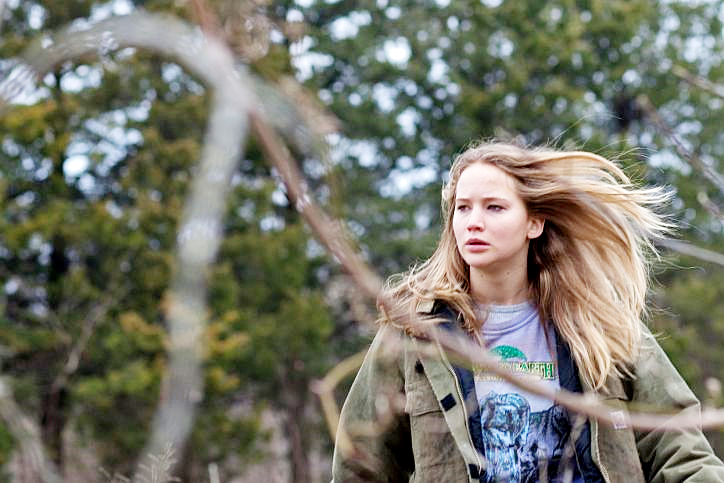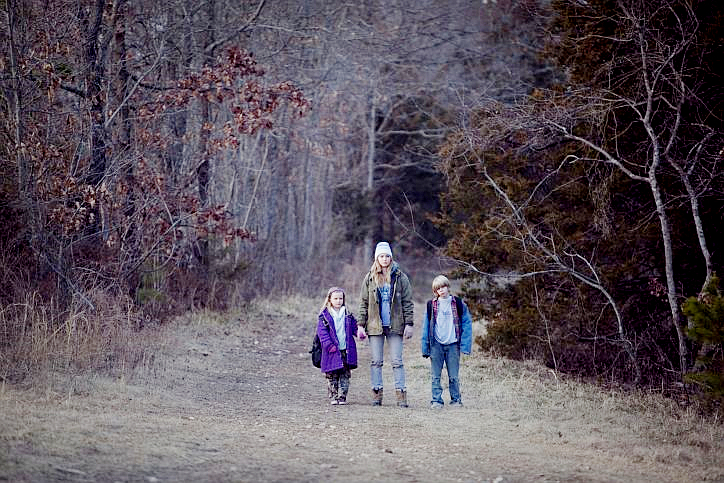
This “dark as a dungeon” Missouri folk tale is well-made, to be sure, and it includes both impressive, nuanced performances — most notably from the Zellweger-esque lead, Jennifer Lawrence — and some very likable actors (John Hawkes and Garret Dillahunt of Deadwood; Sheryl Lee, nee Laura Palmer, of Twin Peaks) shading in the margins. But, for a couple of reasons, which I’ll get into a moment, I didn’t find the main through-line of the story particularly engaging. And, in its depiction of mountain folk living on the economic razor’s edge, I can’t help feeling that the movie veered dangerously close to stereotype, if not outright Precious or Slumdog Millionaire-style poverty pr0n at times.
First, the story. After a few minutes of soaking in the three R’s of life-as-it-really-happens in an economically marginal Missouri town — ROTC training, ramshackle cabins, and (jus’) regular folk — the young woman we’ve been following around, Ree Dolly (Lawrence), is approached by the local sheriff (Dillahunt) with some very problematic news. Apparently, her daddy — who, like all-too-many men in this poverty-stricken region, is a meth cook of some renown — has skipped bail. (Paging Heisenberg!) And if Pa Dolly doesn’t show up for his scheduled hearing a fortnight or so hence, the bond he posted will be taken by the county — in the form of Ree’s house. There isn’t enough money to go around on a good day, and since Ree is already neck-deep in raising her two little siblings and caring for her ailing mother, who’s not quite right in the head, getting turned out of the only home the Dollys have would basically be tantamount to a death sentence.
And so, with only a quick mind and sheer doggedness at her disposal, Ree starts trying to ascertain the whereabouts of the prodigal father, before this deadly eviction hammer falls. Trouble is, the extended community — who are more often than not related by blood ’round these parts — take none too kindly to Ree’s asking tough questions about a central participant in the local, lucrative criminal enterprise. Even Ree’s uncle Teardrop (Hawkes), her father’s brother, tends towards the unhelpful or abusive whenever she comes by for another round for questioning. But what can she do? Ree’s back is to the wall, and the only thing she can do to save her family from certain starvation is to push forward and find her dad, with all the ugly consequences that’ll entail…
Part of the reason Winter’s Bone didn’t work for me, I think, is I felt like I’d just seen a more engaging version of this movie — a regional neo-noir with a bleached-out aesthetic, involving working-class folks in a tight-knit community dabbling in crime to get by — in Nash Edgerton’s The Square. But even that film aside, and with all due respects to the wanderings of M. Lebowski, I get a bit irritated with noir-offerings that put a puzzle before you (in this case, where is Ree’s Pop?), but then don’t really give you the tools to play along.
Put another way: For all Ree’s gumption, only in the occasional scene here — like, when she’s shown a burned-out meth lab where her dad supposedly died — does she get to put two-and-two together in a way that moves the story forward. Instead, she’s more often relegated to being a passive figure in her own tale, at which point some other character will swing by her endangered home and dole out whatever info is needed to get the plot moving again. Perhaps this is by design — one of the best scenes in the movie is when Ree tries to sign up for the Army for an infusion of much-needed cash, and is very kindly told that her options right now are even more limited than they already seemed. Still, this passive tendency makes Winter’s Bone feel like a movie where this happens, and then that happens, and this happens, rather than an engaging mystery. There’s a sense of urgency, sure — the ticking clock of impending eviction — but there’s still no narrative drive to this story.
At which point a fan of this film might say: You’re missing the point. Winter’s Bone is less about typical noir plotting than it is about character, social realism, and establishing a strong sense of place. Well, convenient straw-man fan, I’m glad you got brought this up, because this actually gets to my bigger problem with the movie. From its Welcome-to-the-Real-America opening moments, Granik’s film goes out of its way to establish its versimilitude — but that’s exactly where the movie increasingly felt off to me. And while I think it’s uncharitable to say of Winter’s Bone that it’s the tale of Cletus (or Brandine) the Slack-Jawed Yokel told as tragedy — at times it really does feel like we’re hunting possum in that same hillbilly-stereotype trailer park.
Now, I won’t profess to be any kind of expert on what a life of grinding poverty in the Ozarks looks and feels like — I’ve never been to that part of the country, although I have spent time in some very broke regions of the Carolinas, West Virginia, and the Deep South. So, maybe I’m wrong, and Winter’s Bone is actually witheringly acute in its depiction of the ways of dirt-poor rural folk here. But when there are more scenes of hootenannies and squirrel-hunting in your movie than there are of people doing “normal” things like, say, watching TV or driving to Wal-Mart, I really start to wonder. And that goes double when your characters tend to speak in a near-Milchian poetic argot about their kin and the ways of menfolk and the like.
To be clear: I wasn’t offended by this Othering of them there Mountain folk, but I didn’t really buy into it either. And so the more the film strived toward versimilitude — look at how poor (and yet noble!) poor can be! — the more Winter’s Bone just felt like a hyper-stylized, and even downright artificial, Ozark requiem by way of Cormac McCarthy to me, and the more I disengaged from it. Call me uncouth (I blame mah upbringin’), but, without feeling much of either the story or the milieu, I basically spent the majority of Winter’s Bone — even its ostensibly shocking culmination — just dutifully waiting for it to end.



